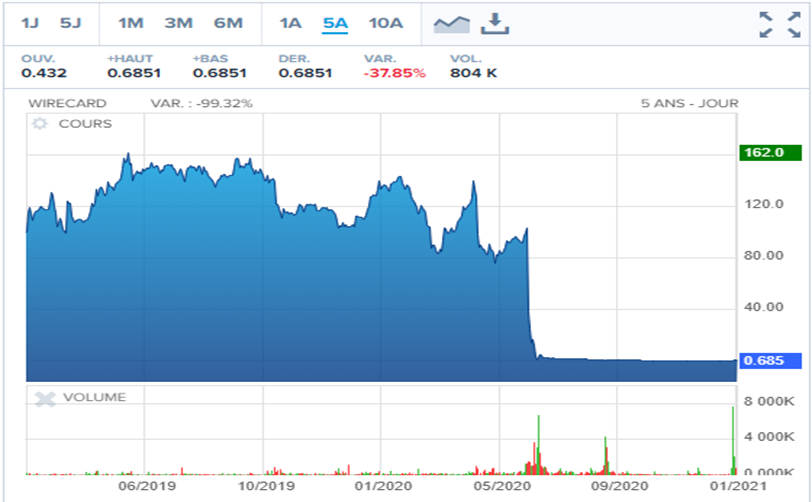Wirecard: the biggest financial scandal in Germany

In this article, Matthieu MENAGER (ESSEC Business School, Global Bachelor in Business Administration (GBBA), 2017-2021) looks back at the Wirecard case, one of the biggest financial scandal in Germany.
Wirecard: what exactly is it?
The Wirecard affair is one of the biggest financial scandals in Germany. Wirecard is a financial start-up founded in 1999 by Markus Braun (an Austrian with a background in computer engineering). This fintech is a German payment and financial services platform. Its first customers were pornography and online betting sites. But little by little, and thanks to the expansion of online sales in the 2000s, Wirecard established itself with airlines, travel agencies, online pharmacies, etc. It was in 2008, unlike traditional banks (2007-2008: the sub-prime crisis) that the company experienced a major boom. In 2010, Jan Marsalek (a very important member of Wirecard) officially became Wirecard’s Chief Operating Officer (COO). His arrival will have a significant impact on the scandal (L’Express, 2022).
The decline
In 2018, Wirecard joined the DAX 30 index (the German equivalent of the CAC 40 index), knocking Commerzbank off the ranking (the second-largest bank in Germany). Between 2016 and 2018, Wirecard’s turnover doubled from €1 billion to €2 billion. At the beginning of 2019, the company had a market capitalisation of €17 billion, comparable to that of Deutsche Bank (Germany’s leading bank), but with fifteen times fewer employees and less turnover. Markus Braun, who held 7% of the shares, was a billionaire at the time. In January 2019, an investigation by the Financial Times (the British financial daily) revealed a number of abuses by Wirecard. According to the newspaper, its managers in Asia had written false contracts and worked on financial manipulations. In November 2019, Ernst & Young (one of the world’s top 4 audit firms) refused to certify the 2017 accounts. In the meantime, it had seen nothing but fire. This crisis has even reached the supervisory authority, which lacks the resources and has not done its job. As a result, supervision has been withdrawn from it in favour of another organisation, the BaFin (the Federal Financial Supervisory Authority, better known by its abbreviation BaFin, is Germany’s financial regulatory authority). In June 2020 everything accelerates:
- Mid-June: Wirecard repeatedly postpones the publication of its annual results (an investigation has been launched into suspicions of stock price manipulation)
- 19 June: Markus Braun resigns
- 21 June: the company confirms that the €1.9 billion mentioned in its balance sheet (i.e. a quarter of the size of the balance sheet) “most probably does not exist”.
- 23 June: Markus Braun is arrested by the authorities, then released on €5 million bail.
- 25 June: The company lost 98% of its value on the stock market, declared itself bankrupt and filed for bankruptcy (Its bank creditors expect to lose 80% of the money lent to Wirecard, according to an estimate by the Wall Street Journal).
Figure 1. The Wirecard’s Share Price.

Source: Boursorama
Figure 1 shows Wirecard’s share price with its entry on the DAX 30 in September 2018. In June 2020, we see the complete decline and the loss of around 98% of its value.
The investigation eventually revealed that Wirecard’s accounts for the years 2015 to 2018 had embellished the situation, in order to make the company attractive to investors. Some of the commissions based on payments did not come from Wirecard but from so-called third parties in Asia and the Gulf region who had a licence to operate. However, “there were in reality no resellers connected by these partners” and therefore no tangible turnover, according to the indictment. The business lawyer Mark Tolentino, presented by the German press as the person who operated as a fiduciary agent on behalf of Wirecard, is a key figure in the case. He claimed to be the victim of identity theft (the sums deposited in the accounts he opened were “just enough to buy an iPhone”).
January 2024, the trial is still ongoing and continues to raise questions about the truth (Euromaidan, 2023). It will probably take a few more months to reach a definitive conclusion. Markus Braun is still in prison and awaiting the end of his trial. Jan Marsalek is still missing. The day after the revelations, he left on a private jet from a small Austrian airport for Belarus. He faces a much longer sentence than the others. The investigators discovered that Jan Marsalek was part crook, part spy for Russia. He was apparently very close to the Kremlin (which also helped him to escape). He had a number of interactions with important figures, including Nicolas Sarkozy (they had lunch together). Neither the German authorities nor Interpol have managed to arrest him. He is now believed to be in Moscow under a false identity, protected by the Federal Security Service of the Russian Federation (FSB). He remains Europe’s most wanted man.
The impact of the scandal on Germany
Wirecard had taken on considerable importance in the lives of German citizens. Its companies manage payments via mobile applications or marketplaces, speed up the granting of credit, facilitate the sending of currency between countries and help companies manage their spending. It is a veritable economic infrastructure, in the same way as energy, water or transport networks. It involves the most delicate thing of all: money. All stakeholders must draw conclusions from the Wirecard scandal, including companies, shareholders, regulators and even customers:
- Start-ups now have two options for operating their services: obtain a payment institution licence, which is time-consuming and costly, or go through intermediaries who offer turnkey payment services.
- Shareholders and financial regulators will be stepping up their supervision.
- Customers will pay more attention to the products they use.
The government also has its share of responsibility in the affair. The German financial market supervisor (BaFin) is under the authority of the Ministry of Finance (formerly headed by Olaf Scholz, who is currently Germany’s Chancellor). Since the affair, Olaf Scholz has announced a reform of the BaFin to give it more power. However, the minister himself was implicated in the scandal: a document from his own ministry states that Olaf Scholz knew that “BaFin was investigating in all directions” Wirecard as early as February 2019. The radical left-wing party Die Linke was outraged: “Negligence in the control of companies worth billions is totally unimaginable”. Chancellor Angela Merkel herself promoted the company during a trip to China in 2019, even though her services (but not herself, according to her circle) were already aware of the existence of an investigation, reports (Le Monde, 2020).
Why should I be interested in this post?
This case is very interesting in terms of the impact it has had on the development of the various authorities in Germany, Europe and the world. Just like the subprime crisis in 2008, the Kerviel affair in 2008, the carbon tax scam between 2008 and 2009, or the CumEx files in 2018, the Wirecard scandal has seen its share of fraud and manipulation. These various scandals show that today’s financial system is still not perfect, and that it must constantly be improved and made more secure to avoid a crash in the national or even global economy. These frauds are also causing a huge chasm in the national economy, which cumulatively is proving to be very significant. Although we cannot yet quantify precisely the impact of the Wirecard scandal on German GDP, we can see that the crises mentioned above (among others) are more than alarming: The CO2 emission allowance scam deprived the French tax authorities of a total of €1.6 billion in revenue, according to the Cour des Comptes. Losses estimated at €5 billion, according to Europol. The fraud perpetrated by the former Société Générale dealing room trader Jérome Kerviel resulted in a loss of €4.9 billion between 2005 and early 2008. The level of losses following the subprime crisis is close to $400 billion or even $500 billion. So, it’s important to be aware of the various mistakes we may have made and to avoid repeating them. I’d also like to take this opportunity to make a transition to the next case I’m going to look at: CumEx files.
N.B.: To find out more about the Wirecard case, you can watch the documentary “Skandal!” or the scripted series “King of Stonks” on Netflix.
Related posts on the SimTrade blog
▶ Louis DETALLE Wirecard: At the heart of the biggest German financial scandal of the 21st century
▶ Nithisha CHALLA The DAX 30 index
Useful resources
France 24 (08/12/2022) Wirecard : le scandale financier qui a secoué l’Allemagne arrive devant la justice
Forbes (17/07/2020) Le Scandale Wirecard Ou La Fintech Au Révélateur
RTL (30/06/2020) Wirecard : tout comprendre au scandale financier qui ébranle l’Allemagne
La Tribune (25/07/2020) Scandale Wirecard : la gigantesque fraude de la fintech expliquée en 5 points
Le Monde (31/08/2022) Comprendre l’affaire Wirecard, le scandale financier qui secoue l’Allemagne depuis juin20 Minutes (19/06/2020) Allemagne : Le scandale Wirecard coûte sa place au patron fondateur Markus Braun
Euromaidan (16/12/2023) WSJ : Wirecard fraudster CEO was Russian agent for nearly a decade
L’Express (08/12/2022) Fraude Wirecard : comment le sulfureux Jan Marsalek est devenu l’homme le plus recherché d’Europe
About the author
The article was written in February 2024 by Matthieu MENAGER (ESSEC Business School, Global Bachelor in Business Administration (GBBA), 2017-2021)
